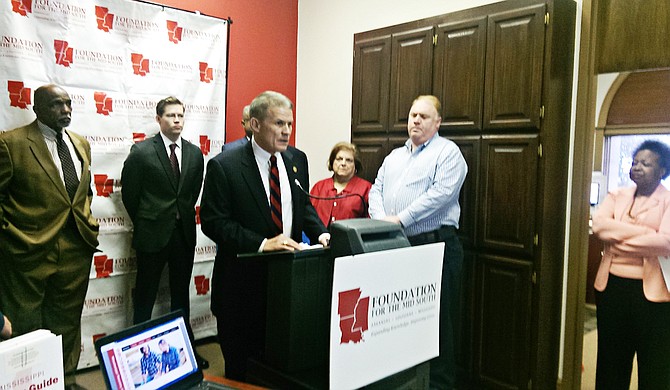MDOC Commissioner Marshall Fisher, the state prisons chief, asked the Legislature for the power to realign his agency and take employees out from oversight of the Mississippi State Personnel Board for one year, a move that often draws criticism from employee-rights groups. Photo by R.L. Nave.
New Way Mississippi doesn't like to publicize the address for its transitional housing and advanced recovery programs for military veterans and formerly incarcerated men and women. "The biggest barrier to providing these services is it's OK as long as the offenders are out in the community homeless, but when we try to deliberate place the guys, it's all 'Not at my backdoor,'" Larry Perry, New Way's president and chief executive officer, told the Jackson Free Press.
Between Hinds and Pike counties, the nonprofit has 124 beds and offers services ranging from drug and alcohol counseling to life-skills training, computer literacy and criminal-thinking prevention. Participants have to be in the program at least four months and can remain up to one year.
Perry stresses that the program does not consist of "halfway houses," a term that has fallen out of favor and doesn't truly reflect what his organization does.
"We meet people where they are. He might be halfway, might be three-quarters—we don't know where he is," Perry said. "Even though a man has been incarcerated, he still has value in our community."
Perry and others who work with incarcerated people acknowledge that one of the system's biggest failings is offer to support to people when they get out of prison.
In response to this need, the Jackson-based Foundation for the Mid South recently published the Mississippi Reentry Guide, a booklet and website of federal, state and county-by-county resources for ex-prisoners and their loved ones, nonprofits, law enforcement agencies, academics and others. "It's important to our community that we give these people some skills so that when they get back into society, they became taxpayers rather than tax burdens," MDOC Commissioner Marshall Fisher said at a press conference last week.
Re-entry has to come into focus recently as the number of people let out of prison in Mississippi, which has one of the nation's highest imprisonment rates, is on the rise. Since last year, the numbers of people on probation and parole have increased from 60.54 percent of all people in the custody of the Mississippi Department of Correction at the beginning of March 2014 to 67.5 percent as of March 4, 2015, MDOC records show.
Overall, the parole and probation population rose from 38,523 in March 2014 to 44,457 in the same time period this year.
Some of the increase is the result of the Mississippi Legislature's passage of HB 585, a series of bills adopted after the 2014 legislative session to help ease the burden on the state's prison system, which always seemed saddled with rising costs and budget deficits, and release more people convicted of non-violent crimes. Prison reform has remained in the news and on the legislative agenda during the current session, which is set to wrap up in early April.
Gov. Phil Bryant brought together a task force in the wake of the scandal involving Chris Epps, who served as commissioner for 12 years before pleading guilty along with Rankin County businessman Cecil McCrory to federal corruption charges. The 49-count indictment charged Epps with steering agency contracts to McCrory-linked businesses in exchange for kickbacks.
The House and State have also approved a bill to create a nine-member reentry council to reduce recidivism rates, improve public safety and lower MDOC costs. Fisher, the state prisons chief, also asked the Legislature for the power to realign his agency and take employees out from oversight of the Mississippi State Personnel Board for one year, a move that often draws criticism from employee-rights groups. "There's a rumor that that's a tool I'm going to use to fire people, and that's not true," Fisher told the Jackson Free Press. "If we've got someone who's not doing their job, we'll deal with them, but I'm not going to go in there to get rid of someone because of their race, sex, their gender, their orientation or their political views.."
Instead, Fisher said the realignment, coupled with the personnel-board exemption, would help him streamline the department and boost salaries. Under the current structure, if a tenured MDOC employees leaves the agency and comes back, he or she would receive the base salary, rather than the higher wage he or she earned at the time of departure.
"We've got corrections officers working for $22,000 (per year)," Fisher said. "That's just not enough for what they do."


